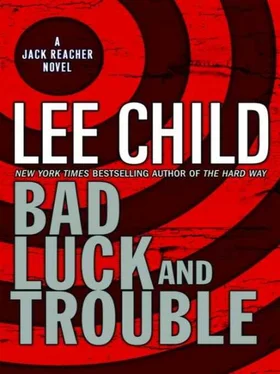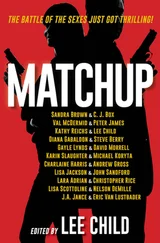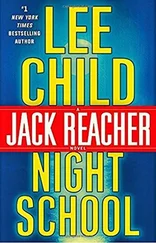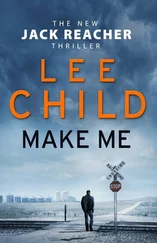There was a body on the floor.
It was a dog.
Once it had been a German shepherd, big, beautiful, maybe a hundred pounds, maybe a hundred and ten. It was lying on its side. Its hair was dead and matted. Its mouth was open. Flies were feasting on its tongue and its nose and its eyes.
Reacher stepped right into the bathroom. Flies swarmed around his shins. There was nothing in the tub. The toilet was empty. All the water was gone from the throat. There were towels undisturbed on the rails. Dried brown stains on the floor. Not blood. Just leakage from failed sphincters.
Reacher backed out of the bathroom.
“It’s his dog,” he said. “Check the other rooms and the garage.”
There was nothing in the other rooms or the garage. No signs of struggle or disturbance, no sign of Swan himself. They regrouped in the hallway. The flies had settled back to their business in the bathroom.
“What happened here?” Neagley asked.
“Swan went out,” O’Donnell said. “Didn’t come back. The dog starved to death.”
“It died of thirst,” Reacher said.
Nobody spoke.
“The water bowl in the kitchen is dry,” Reacher said. “Then it drank what it could from the toilet. Probably lasted about a week.”
“Awful,” Neagley said.
“You bet. I like dogs. If I lived anywhere I’d have three or four. We’re going to rent a helicopter and we’re going to throw these guys out one by one in little pieces.”
“When?”
“Soon.”
O’Donnell said, “We’re going to need more than we’ve got now.”
Reacher said, “So let’s start looking.”
They took scraps of paper towel from the kitchen and balled them up and shoved them up their noses to combat the smell. Settled down to a long and serious search. O’Donnell took the kitchen. Neagley took the living room. Reacher took Swan’s bedroom.
They found nothing of any significance in any of those three places. Quite apart from the dog’s predicament, it was clear that Swan had gone out expecting to return. The dishwasher was half-loaded and had not been run. There was food in the refrigerator and trash in the kitchen pail. Pajamas were folded under the pillow. A half-finished book was resting on the night table. It had one of Swan’s own business cards jammed in it as a placeholder: Anthony Swan, U.S. Army (Retired), Assistant Director of Corporate Security, New Age Defense Systems, Los Angeles, California . On the bottom of the card was an e-mail address and the same direct-line phone number that Reacher and Neagley had tried so many times.
“What exactly does New Age make?” O’Donnell asked.
“Money,” Reacher said. “Although less than it used to, I guess.”
“Does it have a product or is it all research?”
“The woman we saw claimed they’re manufacturing something somewhere.”
“What exactly?”
“We have no idea.”
The three of them tackled the second bedroom together. The one at the back of the house, with the draped slider and the step down to the empty patio. The room had a bed in it but was clearly used as a den most of the time. There was a desk and a phone and a file cabinet and a wall of shelves piled high with the kind of junk that a sentimental person accumulates.
They started with the desk. Three pairs of eyes, three separate assessments. They found nothing. They moved on to the file cabinet. It was full of the kind of routine paperwork any homeowner has. Property taxes, insurance, canceled checks, paid bills, receipts. There was a personal section. Social Security, state and federal income taxes, a contract of employment from New Age Defense Systems, paycheck stubs. It looked like Swan had made a decent living. In a month he had pulled down what Reacher could make last a year and a half.
There was stuff from a veterinarian. The dog had been female. Her name had been Maisi and her shots had all been up-to-date. She had been old but in good health. There was stuff from an organization called People for the Ethical Treatment of Animals. Swan had been a contributor. Big money. Therefore a worthwhile cause, Reacher guessed. Swan was nobody’s fool.
They checked the shelves. Found a shoe box full of photographs. They were random snaps from Swan’s life and career. Maisi the dog was in some of them. Reacher and Neagley and O’Donnell were in others, and Franz, and Karla Dixon, and Sanchez and Orozco, and Stan Lowrey. All of them long ago in the past, younger, different in crucial ways, blazing with youth and vigor and preoccupation. There were random pairings and trios from offices and squad rooms all over the world. One was a formal group portrait, all nine of them in Class A uniforms after a ceremony for a unit citation. Reacher didn’t remember who had taken the picture. An official photographer, probably. He didn’t remember what the citation had been for, either.
“We need to get going,” Neagley said. “Neighbors might have seen us.”
“We’ve got probable cause,” O’Donnell said. “A friend who lives alone, no answer when we knocked on the door, a bad smell from inside.”
Reacher stepped to the desk and picked up the phone. Hit redial . There was a rapid sequence of electronic blips as the circuit remembered the last number called. Then a purring ring tone. Then Angela Franz answered. Reacher could hear Charlie in the background. He put the phone down.
“The last call he made was to Franz,” he said. “At home in Santa Monica.”
“Reporting for duty,” O’Donnell said. “We knew that already. Doesn’t help us.”
“Nothing here helps us,” Neagley said.
“But what isn’t here might,” Reacher said. “His piece of the Berlin Wall isn’t here. There’s no box of stuff from his desk at New Age.”
“How does that help us?”
“It might establish a time line. You get canned, you box up your stuff, you throw it in the trunk of your car, how long do you leave it there before you bring it in the house and deal with it?”
“A day or two, maybe,” O’Donnell said. “A guy like Swan, he’s extremely pissed when it happens, but fundamentally he’s a squared-away personality. He’d suck it up and move on fast enough.”
“Two days?”
“Max.”
“So all of this went down within two days of when New Age let him go.”
“How does that help us?” Neagley asked again.
“No idea,” Reacher said. “But the more we know the luckier we’ll get.”
They left through the kitchen and closed the door but didn’t relock it. No point. The broken glass made it superfluous. They followed the slab path around the side of the garage to the driveway. Headed back to the curb. It was a quiet neighborhood. A dormitory. Nothing was moving. Reacher scanned left and right for signs of nosy neighbors and saw none. No onlookers, no furtive eyes behind twitching drapes.
But he did see a tan Crown Victoria parked forty yards away.
Facing them.
A guy behind the wheel.
Reacher said, “Come to a casual stop and turn around like you’re taking one last look at the house. Make conversation.”
O’Donnell turned.
“Looks like the married officers’ quarters at Fort Hood,” he said.
“Apart from the mail box,” Reacher said.
Neagley turned.
“I like it,” she said. “The mail box, I mean.”
Reacher said, “There’s a tan Crown Vic parked on the curb forty yards west. It’s tailing us. Tailing Neagley, to be precise. It was there when I met her on Sunset and it was there again outside Franz’s place. Now it’s here.”
O’Donnell asked, “Any idea who it is?”
“None at all,” Reacher said. “But I think it’s time to find out.”
“Like we used to?”
Читать дальше












